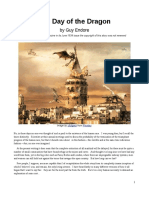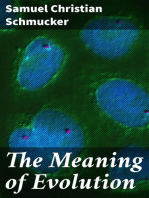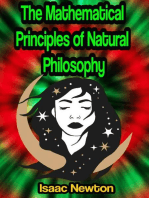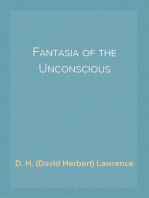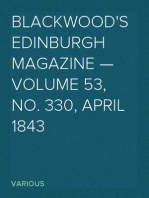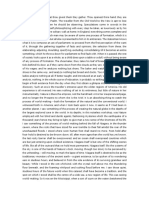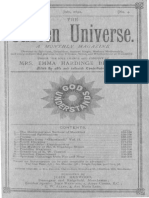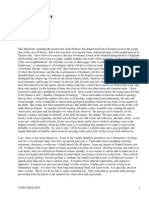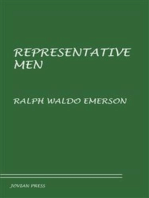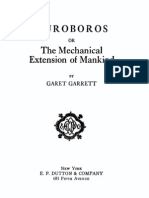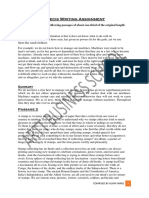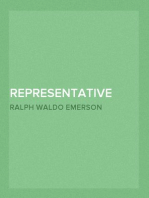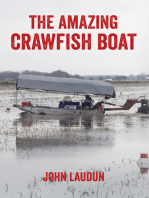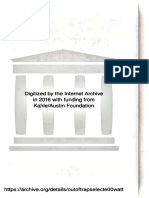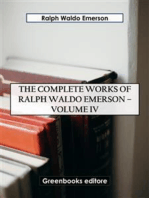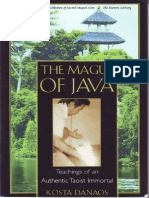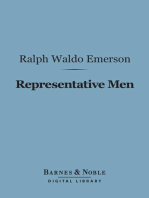A Plea For Pure Science
A Plea For Pure Science
Uploaded by
lugofactorCopyright:
Available Formats
A Plea For Pure Science
A Plea For Pure Science
Uploaded by
lugofactorOriginal Title
Copyright
Available Formats
Share this document
Did you find this document useful?
Is this content inappropriate?
Copyright:
Available Formats
A Plea For Pure Science
A Plea For Pure Science
Uploaded by
lugofactorCopyright:
Available Formats
I
l
I
I
.A.:I:... :;
r ,
I
I
OF THE
I
FRANKLIN
INSTITUTE
I
I
I '
DEVOTED TO
I :
SCIENCE AlND THE MECHANIC ARTS,
I
PUBLISHED BY
I .
jTHE INSTITUTE,
I
I
Under the Direction of the Committee on Publication.
I Vol. CXVI.-Nos. s9J--696.
I I THIRD SERIES.
VOL. LXrXVI;-JULY TO DECEMBER, 1883.
I
I
I PHILADELPHIA:
INSTITUTE, No. 15 SoUTH SEVENTH STREET
l
1888.
I.
I
!
Oct., 1888.] A Plea jm Pure ScienCe. 2t9
A PLEA FOR PURE SCIENCE.*
By PRoF. H. A. RowLAND.
[Au addreRs delivered before Section B (Physics), American Association for the
Advancement of Science. Minneapolis, 1888.]
The question is sometimes asked us as to the time of year we li e
the best. To my mind, the sprill6 is the most delightful ; for nato
then recovers from the apathy of winter, and stirs herself to renew
life. The leaves grow, and the buds open, with a suggestion of vi r
delightful to behold; and we revel in this ever-renewed life of natur
But this cannot always last. The leaves reach their limit; the bu
open to the full, and pass away. Then we begin to ask ourselv
whether all this display has been in vain, or whether it has led to
bountiful harvest.
So this magnificent country of ours has rivalled the vigor of spri
in its growth. Forests have been levelled, and cities built, and
large and powerful nation has been created on the face of the ea
'Ve are proud of our advancement. We are proud of such cities
this, founded in a day upon a spot over which, but a few years sin ,
the red man hunted the buffalo. But we must remember that this s
only the spring of our co11ntry. Our glance must not be backward!;
for however beautiful leaves and blossoms are, and however marve -
lous their mpid increase, they are but leaves and blossoms after alJ.
Rather should we look forward to discover what will be the outcome
of all this, and what the chance of harvest. For if we do this in tim
we may' discover the worm which threatens the ripe fruit, or the barre
"spot where the harvest is withering for want of water.
I am required to address the so-called physical section of this ass
ciation. Fain would I speak pleasant words to you on this subject;
fain would I recount to you the progress wade in this subject by m
countrymen, and their noble efforts to understand the order of th
universe. But I go out to gather the grain ripe to the harvest, and I
find only tares. Here and then a noble head of grain rises above tbk
weeds; but so fe\v are they, that I find the majority of my countrtr
men know them not., but think that they have a waving harvest, whil
* In using the word " science," I refer to physical science, as I kno
nothing of natuml science. Probably my remarks will, however, apply
both, but i do not know .
!
I
I
280
1
1 A Plea i'm Pure Science. [J F nk 1
J' our. ra nat.,
I
it is onl,.r one of weeds after all. American science is a thing of
the futule, and not 1>f the present or past ; and the proper course of
one in + on is to consider what must be done to create a science
of phys1'f3 m th1s country, rather than to call telegraphs, electric lights,
and such con\(eniences, by the name of science. l do not wish to
underratk the value of all these things: the progress of the world
depends bn and he is to be honored who cultivates them success-
fuJly. So the cook who invents a new and palntable dish for the
table bedefits tpe world to a certain degree ; yet we do not dignify him
by the Qf a chemist. .And yet it is not an uncommon thing,
especiallf in .American newspapers, to have the appli.cations of science
with pure science; and some obscure American who steals
the of some great mind of past, and enriches himself by the
application of I the !38Dle to domestic uses, is often lauded above the
great orit inator of the idPa, who might have worken out hundreds of
such applicatiJns, had his mind possessed the neces.<mry element of
vulgaricyf. I ' ave often been asked, which was the more important to
the wori4, pure or applied science. To have the applications of a
science, tpe itself must exist. Should we stop its progress, and
attend oqly to its applications, we should soon degenerate into a people
like the 0hinJe, who have made no progress for generations, because
they haJr been satisfied with the applications of science, and have
never soqght for reasons in what they have done. The reasons con-
stitute pure scienre. They have known the application of gunpowder
for centuHes; and yet the reasons for its peculiar action, if. sought in
the propfr would have developed the science of chemistry,
and even! of physics, with all their numerous applications. By con-
tenting themselves with the fact that gunpowder will explode, and
seeking ho fatther, they have fallen behind in the progress of the
world ; now regard this oldest and most numerous of nations
as only br rbarians. And yet our own country is in the same state.
But we nave done better ; for we have taken the science of the Old
I
World, and applied it to all our uses, accepting it like the rain of
heaven, asking whence it came, or even acknowledging the
debt of we owe to the great nod unselfish workers who have
given it I to us. And, like the rain of heaven, this pure science has
fallen oulj country, and made it great. and rich and strong.
To a civilized nati(ln of the present day, the applications of science
are a and our country bas hitherto succeeded in this line,
,
Oct., 1888.]
A Plea for Pure Science.
only for the reason that there are certain countries in the world whe
pure science has been and is cultivated, and where the of natu
is considered a noble pursuit. But such countries are rare, and th
who wish 'to pursue pure science in our own country must be prepa
to face public opinion in a manner which requires much moral courage
They must be prepared to be looked down upon by every su
inventor whose shallow mind imagines that the only pursuit of man
is wealth, and that he who obtains most has beAt succeeded i
this world. Everybody can comprehend a million of money ; but bo
few can comprehend any advance in scientific theory, especially in i
more abstruse portions ! And this, I believe, is one of the rauses o
the small number of persons who have ever devoted themselves
work of the higher order in any human pursuit. Man is a gregariou
animal, and depends very much, for his happiness, on the sympathy o
those around him ; and it is rare to find one with the courage to pursu
his own ideals in spite of his surroundings. times past! men
more isolated than at present, and each came m contact With a fewe
number of people. Hence that time constitutes the period when th
great sculptures, paintings and poems were produced. Each man'T
mind was comparatively free to follow its own ideals, and the resu3
were the great and unique works of the ancient masters. To-day th
railroad and the telegraph, the books and the newspapers, have unit
eaCh individual man with the rest of the world: instead of his min
being an individual, a thing apart by itself, and unique, it has becom
so influenced by the outer world, and so dependent upon it, that it h
lost its originality to a great extent. The man who in times pas
would naturally have been in the lowest depths of poYerty, mentall
and physically, to-day measures tape behind a countt>.r, and with lordl
air advises the naturally horn genius how he may best bring his ou
ward appearance down to a level with his own. A new idea he neve
had but he can at least cover his mental nakedness 'vith ideas imbi
,
from others. So the genius of the past soon perceives that his highe
ideas are too high to be appreciated by the world ; his mind is clippe
down to the standard form ; every natural o:fftihoot upwards is repressed
until the man is no higher than his fellows. Hence the world, throng
the abundance of its intercourse, is reduced to a level. What was for
merly a grand and magnificent landscape, with mountains
above the clouds, and depths whose gloom we cannot no'v appreCJat
has become serene and peaceful. The dept.hs have been :filled, and th
'
282 .A Plea for Pure &icnce.
[Jour. Frank. I lilt,
heights and the wavy harvests and smoky factories cover the
landscape.
As fak- as average man is concerned, the change is for the better.
The life of man is far pleasanter, and his mental condition
better, ifan before. But we miss the vigor imparted by the moun-
tains. F e are tired of mediocrity, the curse of our country. We are
tired of F.ing1 our artists reduced to hirelings, and imploring Congress
to them against foreign competition. We are tired of seeing
our con trymen take their science nom abroad, and boJst that they
here co vert it into wealth. We are tired of seeing our professors
theh chairs by the pursuit of applied science instead of pure
scientoe; I or sitting inactive while the whole world is open to inyestiga-
tion ; by the wayside while the problem of the universe
remains junsolved. We wish for something higher and nobler in this
country
1
of mediocrity, for a mountain to relieve the landscape of its
We are surrounded with mysteries, and have been creak<!
with minds tolenjoy and reason to aid in the unfolding of such myste-
ries. lcalls to us to sturly her, and our better feelings urge us
in the same direction.
For gfneratlons there have been some few students of science who
have esteemed
1
the study of nature the most noble of pursuits. Some
have been wealthy, and some poor; but they have all had one thing
in commbn-tbe love of nature and its laws. these few men the
world o al' the progress due to applied SCience, and yet very few
ever received any payment in this world for their labors.
the great discoverer of the principle on which all machinBR
for electfic lighting, electric railways, and the transmission of power,
must rest, diedi a poor man, although others and the whole world have
been enriched by his discoveries. And such must be the fate of the
in his footsteps for some time to come.
But there "fill be those in the future who will study nature from
pure and 1for them higher prizes than any yet obtained are waiting.
We havJ but yet {'Ommenced our pursuit of science, and stand upon the
threshold wondering what there is within. we explain the motion of
the by the la'v of gravitation; but who will explain how two
bodies, of miles apart, tend to go toward each other with a.
I
certain force?
We nJ w weigh and measure electricity and electric currents with as
I '
much ear as ordinary matter, yet have we made any approach to an
'
Oct., 1883.]
A Plea jo1 Pure Science.
explanation of .the phenomenon of .electricity? Light is an undulato
motion, and yet do we know what it is that undulates? Heat is m
tion, yet do we know what it is that moves? Ordinary matter is a
common substance, and yet who shall fathom the mystery of its int -
nal constitution ? d
There is room for all in the work, and the race has but commen
The problems are not to be solved in a moment, but need the best wo
of the best minds, for an indefinite time.
Shall our country be contented to stand by, while other
lead in the race? Shall we -always grovel in the dust, and pick up e
crumbs which fall from the rich man's table, consisting ourselves rich
than he because we have more crumbs, while we forget that he has t e
cake, which is the source of all crnmbs? Shall we be swine, to who
the com and husks are of more value than the pearls? If I
aright the signs of the times, I think we shall not always be conten
with our inferior position. From looking down we have almost beco e
blind, but may recover. In a new country the necessities of life muit
be attended to first. The curse of Adam is upon us all, and we ml
1
earn our bread.
But it is the mission of applied science to render this easier for e
whole world. There is a story which I once read, which will illu
trate the true position of applied science in the world. A boy, more
fond of reading than of work, was employed, in the early days of t e
.steam-engine, to turn the valve at every stroke. Necessity "\\"88 ilie
mother of invention in his case: his reading was disturbed by his worJt,
and he soon discovered that be might become free from his work by sb
tying the valve to some movable portion of the engine, as to make
move its own valve. So I consider that the true pursuit of mankin
is intellectual. The scientific study of nature in all its branches,
mathematics, of mankind in its past and pr>sent, the pursuit of art, an
the cultivation of all that is great and noble in the world-these a
the highest occupation of mankind. Commerce, the
science, the accumulation of wealth, are necessities which are a cu
to those with high ideals,but a blessing to that portion of the worl
which has neither the ability nor the taste for higher pursuits.
As the applications of science multiply, living becomes easier, th
wealt.h necessary for the purchase of apparatus can better be obtain ,
and the pursuit of other things besides the necessities of life becom
possible.
284 .A Plea for Pwe Science.
[Jour. Frank.lnat.,
But the moral qualities must also be cultivated in l)roportion to the
wealth of the country, before much can be done in pure science. The
sculptor or painter naturally attains to wealth through the
legitimate work of his profession. The novelist, the poet, the musician,
all have wealth before them as the end of a successful career. But the
scientist and the mathematician have no such incentive to work : they
must earn their living by other pursuits, usually teaching, and only
devote their surplus time to the true pursuit of their science. And fre-
quently, bythesmall salary which they receive, by the lnckofinstrumental
and facilities by the mental atmosphere in which they exist,
and mos1l of all, by their low ideals of life, they are led to devote their
surplus time to applied science or to other means of increasing their
fortune. How shall we, then, honor the few, the very few, who, in
in spite of all difficulties, have kept their eyes fixed on the goal, and
have steadily worked for pure science, giving to the world a most
precious donation, which has borne fruit in our greater knowledge of
the universe and in the applications to our physical life which have
enriched thousands and benefitted each one of us? There are also
those have every facility for the pursuit of science, who have an
ample and every appliance for work<>, yet who devote them-
selves to commercial work, to testifying in courts of l'\w, and to any
other work to increase their present large income. Such men would
be respectable if they gave up the uame of professor, and took that of
consulting chemists or physicists. And such men are needed in the
community: But for a man to occupy the professor's chair in a promi-
nent and, by his energy and ability in the commercial applica-
tions of science, stand before tlie local community in a prominent
manner, 4nd bet-orne the newspaper exponent of his science, is a dis-
grace to him and his college. It is the death-blow to science in
that Call him by his proper name, and he becomes at once a
useful member of the community. Put in his place a man who shall
by and example cultivate his scit-nce, and how different is the
result! r oung men, looking forward into tlie world for something
to do, see I before them this high and noble Hfe, and they see that there
is something more honorable than the accumulation of wealth. They
are thus 1bd to
1
devote their lives to similar pursuits, and they honor
the profekor who has drawn them to somet.hing higher than they
might otbierwise have aspired to reach.
I do mit wish to be misunderstood in this matter. It is no disgrace
Oct., 1883.j
.A Plea for .Pute Science. 28
to make money by an invention, or otherwise, or to do commercial
scientific work under some circumstances. But let pure science be th&
aim of those in the chairs of and so prominently the aiin
that there can be no mistake. If our ajm in life is wealth, let us honl
estly engage in commercial pursuits, and compete with others for itS
possession. But if we a life which we consider higher, let J
live up to it, taking wealth or poverty as it may chance to come to
but letting neither turn us aside from our pursuit. 1
The work or teaching may absorb the energies of many; and, indeed
this is the excuse given by most for not doing any scientific workl
But there is an old saying, that where there is a will there is a wayt
Few professors do as much teaching or lecturing as the German
jrors, who are also noted for their elaborate papers in the
JOUrnals. I myself have been burdened down with work, and
what it is; and yet I here assert that all can find time for
research if they desire it. But here again, that curse o( our
mediocrity, is upon us. pur colleges and universities seldom call for
first-class men of reputation, and I ha.ve even heard the trustee of
well-known college assert that no professor should engage in researcH
because of the time wasted ! I was glad to see, soon after, by the call
of a prominent scientist to that college, that the majority of the trust
did not agree with him.
That teaching is important, goes without saying. .A successful
teacher is to be respected ; but if he does not lead his scholars to that
which is 'the highest, is he not blameworthy? We are, then, to loo'
to the colleges and universities of the land for most of the work in
pure sci<'nce which is done. Let us therefore examine these latter, and
see what the prospect is.
One, whom perhaps we may here style a practical follower o
Ru8kin, has stated that while in this country he was variously desig
nated by the title of captain, colonel, and professor. The story may
or may not be true, but we all know enough of the customs of o.J.
countrymen not to dispute it on general principles. All men are bory
equal : some men are captains, colonels, and professors, and
all men are such. The logic is conclusive; and the same kind of logic
seems to have been applied to our schools, colleges, and
I have before me the report of the commissioner of education for 1880 .
.According to that report, there were 389, * or say, in round number, ,
* 364 reported on, and .25 not reported.
286
I.
A Plea for Pure Science. [Jour. Jt'rank. Inst.,
400 calling themselves colleges or universities, in our
country! I We may we11 exclaim that ours is a great country, having
more than the whole world beside. The fact is sufficient. The whole
earth woJid support such a number of first-class institutions.
The cursd of must be upon them, to swarm in such num-
bers. Tlley mttst be a cloud of mosquitoes, instead of eagles as they
profess. lAnd this becomP.S eYident on further analysis. About one-
third aspfra to the name of university ; and I note one called by that
name has two professors and 18 students, and another having
three teachers and 12 students! And these instances are not unique,
for the of small institutions and schools which call themselves
universitiF is very great. It is difficult to decide from the statistics
alone the 1exact :standing of these institutions. The extremes are easy
to manage. Who can doubt that an institution with over 800 students,
and a faci lty of 70, is of a higher grade than those above cited having
10 or 20 rtudents an-d two or three in the faculty? Yet this is not
always for I note one institution with over 500 students which
is known me personally as of the grade of a high school. The sta-
tistics arelmore _or less defective, and it would much weaken the force
of my remarks I went too much into detail. :I append the following
tables, hoivever, of 330 so-called colleges and universities:
I
i 218 had from 0 to 100 students.
! 88 " " 100 " 200 "
I
I 12 II u 200 II 800 11
6 " ,, 800 " 500 "
1 6 over 500
I
Of 322 colleges and universities:
I 206 had 0 to 10 in the faculty.
i 99 " 10 " 20 " "
; I 17 " 20orover" "
If the were possibly they may exist-
we might jalso get an idea of the standing of these institutions and their
approach lto the true university idea, by the average age of the scholars.
Possibly Jlso the ratio of number of scholars to teachers might be -of some
help. All these methods give an approximation to the present standing
of the institutiops. But there is another method of attacking the prob-
lem, whio)l is very exact, but it only gives us the p088ibililies of which
the insti1 tion is capable. I refer to the wealth of the institution. In
?ct., 1888.] A Pleajor:Pure Science.
287
the I. not included the value of grounds and
bwldmgs, for this JS of httle Importance, either to the present or future
standing of the institution. .As good work can be done in a hovel as
in a palace. I have taken the productive funds of the institution as
the basis of estimate. I find :
284 have below $500,000.
8 " between $.500,000 and $1,000,000.
8 " over $1,000,000.
There is no fact more established, all over the world than
that the }Iigher education carnever be made t.o pay for itsel
the cost to a. college, of edumting a young man, very much exceeds
what he pays for it, and is often three or four times as much. The
higher the education, the greater this proportion will be and a uni-
versity of the highest class should anticipate only a small' accession to
its inco.me from the fees of students. Hence the test I applied
give a true representation of the possibilities in every case. Ae-
cordmg to the figures, only 16 colleges and universities have $500 000
or over of invested funds, and only one-half of these have $1,000:000
and over. Now, even the latter sum is a very small endowment for a
college; to call any institution a bniversity which has less than
$1,000,000, is to render it absurd in the face of the world. And yet
m?re than 100 of our institutions, many of them very respectable col-
leges, have abused the word "university" in this manner. It is to he
hoped that the endowment of the more respectable of these institutions
may be increased, as many of them deserve it; and their unfortunate
appellation has probably been repented of . long since.
But what shaH we think of a community that gives the charter of a
university to an institution with n total of $20,000 endowment, two
so-called professors, and 18 students? or another with three professors,
12. and a of $27,000 endowment, mostly invested in
buildmgs! And yet_ t_here are very many similar institutions there
being 16 with three professors or less, and very many indeed wiili only
four or five. -
fucts these <:<mld only in a democratic country, where
pnde IS taken 10 reducmg everythmg to a level. And I may also say
can only. in the early days of such a democracy; for an
mtelligent pubhc Will soon perceive that calling a thing by a wrong
name not change its character, and that truth, above all things,
should be taught to the youth of the nation.
I
288 1
1
A Plea for Pure Science. [Jour. Frank.lDst.,
It mJ,y be urged, that. all these institutions are doing good work in
and that many young thus taught, who _could not
afford tq go to a true college or umversaty. But I do not obJect to the
educatidn,-though I have 110 doubt an investigation would disclose
equal absurdities here,-for it is aside from my object. But I do object
to loweljing the ideals of the youth of the country. Let them' know that
they are attenping a school, and not a university ; and let them know
that abdvcthem comes the college, and above that the university. Let
them be taught that they are only half educated, and that there are
persons in the world by whose l!ide they are but atoms. In other
words, let them be taught the truth.
It may be that some small institutions are of high gnvJe, especially
those which are new; but who can doubt that more than two-thirds of
our institutions calling themselves colleges and universities are unworthy
of the rlame ?l Each one of these institutions has so-called professors,
hut it iJ evident that they can be only of the grade of teachers. Why
should they not be so called? The position of teacher is an honored
one, but is not made more honorable by the assumption of a false title.
Furthermore, the multiplication of the title, and the ease with which
it can obtatned, render it scarcely worth striving for. When the
man of energy, ability, and perhaps genius is rewarded by the same
title ancll emoluments as the commonplace man with the modicum of
knowledlge, who t,akes to teaching, not because of any aptitude for his
work, Hut possibly because he has not the energy to compete with his
in business, then I say one of the inducements for first-
class to become professors is gone.
Whe,n work and ability ue required for the position, and when the
profess9r is expected to keep up with the progress of his subject, and
to do all in his power to advance it, and when he is selected for these
reasons, then the position will be worth working for, and the success-
ful corrlpetitor will be honored accordingly. The chivalric spirit which
Faraday to devote his life to the study of nature may actuate
a few :qoble ken to give their life to scientific work; but, if we wish
to culti:Vate this highest class of men in science, we must open a career
for ther wot,tthy of their efforts,
Jenny with her beautiful voice, would have cultivated it to
some ektent n her native village; yet who wotild expect her to travel
over the world, and give concerts for nothing? and how would she
have hken able to do if she had wished ? And so the scientific man,
Oot.,1883.] A Plea for P;ure Science.
whatever natural talents, must instruments and a library, d
a suitable and respectable salary to live upon, before he is able .to ex rt
himself to his full capacity. This is true of advance in all the big
1
er
departments of human learning, and yet somethin;.more is necessa
It is not those in this country who receive the larg'"t salary, and h e
positions in the richest colleges, who have advanced their subject e
most: men receiving the highest salaries, and occupying the professo 's
chair, are to-day doing absolutely nothing in pure science, but e
striving by the commercial applications of their science to increase th ir
already large salary. Such pursuits, as I have said before, are bon -
able in their proper place; but the duty of a professor is to ad van
his science, and to set an example of pure and true devotion to it whi
shall demonstrate to his students and the world that there is someth g
high and noble worth living for. Money-changers are often res
able men, and yet they were once severely rebuked for carrving n
trade in the court of the temple.
Wealth does not coDI!titute a university, do not: it is
men who constitute its faculty, and the students who learn from the .
It is the last and highest step which the mere student takes. He goes
into and the height which he rises been influenced 1\J
the wbtch he has CODBCIOUSly or UDCOnBCIOUS}y imbibed in hrs
university. If the professors under whom he has studied have b
high in their profession, and have themselves had high ideals; if th
have considered the advance of their particular subject their high
work in life, and are themselves honored for their intellect througho t
the world,-the student is drawn toward that \vhich is highest, an
evei' . .after in life has high ideals. But if the student is taught by wh t
are sometimes called good teachers, and teacher;; only, who know litt e
more than the student, and who are often surpassed and even despis
by him, no one can doubt the lowered tone of his mind. He fin
by his feeble efforts he can surpass one to whom a university h
given its highest honor; and he begins to think that he himself is
born genius, and the incentive to work is gone. He is great by th
side of the molehill, and does not know any mountain to compare hi
self with.
A university should not only have great moo in its faculty, bot hav
numerous minor professors and assistants of all kinds, and shoul
encourage the highest work, if for no other reason than to enco
the student to his highest efforl'a.
WHOLE No. Vor.. CXVI.-(TXIBD BEBIES, Vol.Ixxxvi.)
19
r
290
I
A Plea for Pure Science.
But, asj;uming that the professor has high ideals, wealth such as only
a large aqd high university can command is necessary to allow him the
fullest der elopment.
And tliis is specially so in our science of phyeics. . In the early days
of physiJ andchemistry, many of the fundamental experiments could
be with the simplest apparatus. And so we often :find the
names of I and Faraday mentioned as needing ecarcely any-
thing fori researches. Much can even now be done with the
simplest and nobody, except the utterly incompetent, need
stop for * ant of it. But the fact remains, that one can only be free to
investigale in aJl departments of chemistry and physia;, when he not
only has Ia complete laboratory at his command, but a friend to draw
on for the expenses of each experiment. That simplest af the depart-
ments of lphysics, namely, I!Btronomy, has now reached such perfection
that nobOdy can expect to do much more in it without a perfect.ly
equipped! obsenvatory ; and even this would be useless without an
income sufficieJ t to employ a corps of assistants to make the observa-
tions and comJ utations. But even in this simplest of physical sub-
jects, thete is great misunderstanding. Our -country has very many
excellent! ohserivatories : and yet little work is done in comparison,
because no provision has been made for maintaining the work of the
I
observatGry ; the wealth which, if concentrated, might have made .
one effective observatory which would prove a benefit to astronomical
science, scattered among a half-dozen, merely furnishes tele-
scopes fdr the people in the surrounding region to view the moon with.
And he* I strike the keynote of at least one need of our country, if
she would stand well in science; and the following item which clip
from a will illust.rate the matter:
" Thel eccentric oltl Canadian, Arunah Huntington, who left $200,-
000 to lhe divided among the public of Y ermont, has done
I
something which will be of little practical value to the schools. Each
district ivm be entitled to the insignificant sum of $10, which will not
advance! much the cause of education."
dispute the folly of such a bequest, or the folly of :fill-
ing the f<>untey with telescopes to look at the moon, and calling them
observatories. How much better to concentrate the wealth into a few
parcels, make first-cla.o;s observatories and institutions with it !
Is it that any of our four hundred colleges and universities
have love enough of learning to unite with each other and form larger
I
Oct., 1883.] A Plea for Pure Science.
institutions? Is it possible that any have such a love of truth hat
they are willing to he called by their right name? I fear n.ot; for he
spirit of expectatioJl, which is analogous to the spirit of gamblint is
strong in the American breast, and each institution which now, pt
in name, slumbers in obscurity, expects in time to bloom out into ull
prosperity. Although many of them are under religiol influe ce,
where truth is inculcated, and where men are taught to take a low t
at the table in order that they may be honored by being called up
higher, and not dishonored by being thrust down lower, yet ese
institutions have thrnst themselves into the highest seats, and can ot
probably be dislodged.
But would it not be possible to so change public opinion that no
lege could be founded with a less endowment than sav $1 000 000
. ' '
no university with less than three or four times that amount? F
the report of the Commissioner of Education, I learn that such a ch
is taking place; that the tendency towards large institutions is incr
ing, and that it is J>rincipllllY in the west and southwest that the
tiplication of small institutions with big names is to be feared m
and that the east is almost ready for the great coming universitv.
The total wealth of the four hundred colleges universiti in
1880 was about $40,000,000 in bui'ldings, and $43,000,000 in prod c-
tive This would be sufficient for one great university of $1 ,-
000,000, four of $5,000,000, and twenty-six colleges of $2,000,
each. But such an idea can of course never be carried out. Gove -
ment appropriations are out of the question, because no political trick
must be allowed around the ideal institution.
In the year 1880 the private bequests to all schools and coli
amounted to about $5,500,000 ; and, although there was one bequ
of $1,250,000, yet the amount does not appear to be phenomenal. It
would thus seem that the total amount was about :five million
one year, of which more than half is given to so-called colleges a d
universities. It would be very difficult to regulate these bequests so
that they might be concentrated sufficiently to ,produce an immedi te
result. But the :figures show that generosity is a prominent feature of
the American people, and that the needs of the country only have to
appreciated to have the funds forthcoming. We must make the n
of research and of pure science felt in the country. We must live s h
lives of pure devotion to our science, that all shall see that we ask or
money, not that we may live in indolent ease at the expense of chari ,
I
292"
I
A Plea JO!' Pure Science. [Jour. Frank. !nat.,
I
but that may work for that which bas advanced and will advance
the world I more than any subject, both. and physi-
caJly. We mu$ live such hves as to neutralize the mfluence of those
who in hikh places have degraded their profession, or have given them-
selves over to ease, and do nothing for the science which they repre-
sent. Let us do what we can with the present means at our disposal.
There is one of us who is situated in the position best adapted to
bring out J all his powers, and to allow him .to do for his
All have difficulties, and I do not thmk th.at ?Ircumstances
ever a man. If a man has the mstmct of research m
him it wih itself in some form. But circumstances may
it iJ to new pnths, or may foster it 80 that what would otherwise
have diedla.s a bud now blossoms and ripens into the perfect fruit.
Americkns have shown no lack of invention in small things ; and
the same , pirit, when united to knowledge and love of science, becomes
the spirit of research. The telegraph operator, kno\vl-
edge of dlectricity and its laws, naturally turns his attention to the
of the only electrical instrument he anything
about ; aiJd his
1
researches would be confined to the hmited sphere of
his knmd edge, and to the simple laws with which he is acqua.inted.
But as hi$ knowledge increases, and the field broadens before him, as
he studies\ the oiathematical theory of the subject, and the electro-mag-
netic of 'light loses the dim haze .due to distance, and
his const)'nt companion, the mstrument becomes him a
toy, and liis effort to discover 80metlung new becomes research m pure
science. I
It is o attempt to advance science until one has mastered the
science he must step to the front hE-fore his blows can tell in the strife.
Furthe;niore, ] do not believe anybody be thorough in any depart-
ment of without wishing to advance it. In the study of what
is known! in the reading of the scientific journals, and the discussions
therein of the current scientific questions, one would obtain
an impuise to 'work, even though it did not bef(lre exist. And the
same spiHt wbich prompted him to seek what was already known,
would mhke hhn wish to know the unknown. And I may say that I
never m+ a case of thorough knowledge in my own science, except
n the of well-known investigators. I have met men who talked
and I haJ e sometimes asked myRelf why they did not do some-
bpt further knowledge of their character has shown me the
Oct., 1888.] A Plea for Pure .&ience. 93
superficia]ty of their knowledge. I am no longer a believer in men
who could do something if they would, or would do something if t hPy
had a chanpe. They are imposters. If the true spirit is there, it Jri n
show itself in spite of circumstances.
As I remarked before, the investigator in pure science is usuall a
professor. He niust teach as well as investigate. It is a quest on
which has been discussed in late years, as to whether these two fubc-
tions would better be combined in the individual, or sepa!ra
1
.
It seems to be the of most, that a certain amount of teach )
is conducive, rather than otherwise, to the spirit of research. I m
think that this is true, and I should myself not like to give up y
daily lecture. But one must not be overburdened. I suppose that
1
he
true solution, in many cases, would be found in the multiplication of
assistants, not only for the' work of teaching, but of research. So e
men are gifted with more ideas than they can work out with their o
hands, and the world is losing much by not supplying them with e ra
hands. Life is short; old age comes quickly, and the amount one ir
of hands can do is very limited. What sort of shop wonld that be, or
what. sort of factory, where one man had to do all the work with is
own hands ? It is a fact in nature, which no democracy can chan ,
than men are not equal-that some have brains, and some hands. A d
no idle talk about equality can ever subvert the order of the unive
I know of no institution in this country where are su
plied to aid directly in research. Yet why should it not be 80 ? A d
even the absence of assistant professon; and assistants of all kinds,
aid in teaching, is very noticeable, and must be remedied before we
expect much.
There are many physical problems, especiu lly those requiring ex
measurements, which cannot be carried out by one man, and can on y
be succt'SSfully attacked by the most elaborate apparatus, and wit a
full corps of assistants. Such IU'e Regnault's experiments on t e
fundamental laws of gases and vapors, made thirty or forty years
by aid from the French and which are the standards o
this day. Although these experiments were made with a view to t e
practical calculation of the yet. they were carried out 'n
such a brood spirit that they have been of the greatest theoretical u .
Again, what would astronomy have done 'vithout the endowmentc; f
observatories? By their means, that science has become the most -
feet of all branches of physics, as it should be from its
I
2!-l4 I A Plea for Pure Science. [Jour. Frank. Inst..
There is lno doubt, in my mind, that similar inititutions for other
branches (If physics, or, better, to include the whole of physics, would
be equally successt'ul. A large and perfectly equipped physical lab-
oratory wjth large revenues, its corps of professors and assistants,
and its mkchinE!-shop for the construction of new apparatus, would be
able to ahvnnc1 our science quite as much ru:; endowed observatories
have But such a laboratory should not be founded rashly.
The value will depend entirely on the physicist at it'3 head, who has to
deville the plan, and to start it into practical working. Such a man
will always be rare, aud cannot always be obtained. After one had
been successfully started, otherR could follow ; for imitation requires
little braif s.
One coljlld not be certain of getting the proper man every time, but
the meansl of appointment should be most carefully studied so as to
secure a ;boo a\\'erage. There can be no doubt that the appointment
should rest with a scientific body capable of judging the highest work
of each candidate.
Should any popular element enter, the person chosen would be either
of the order, or the dabbler on the outskirts who
present.,; his discoveries in the most theatrical manner. What is
required is a man of depth, who has such an insight into physical
science tMt he can tell when blows will best tell for its advancement.
Such a grandJ laboratory as I describe does not exist in the world, at
present, f6r the study of physics. Rut no trouble has ever been found
in obtaintng means to endow astronomical science. Everybody can
appreciatJ, to some extent, the value of an observatory; as astronomy
is the l of scientific subjects, and has very quickly reached a
position t here elaborate instruments and costly computations are
necessary to further advance. The whole domain of physics is so wide
that workb:N have hitherto found enough to do. But it cannot always
be so, anJ the time has even now arrived when such a grand labora-
tory be, founded. Shall our country take the lead in this
matter, or) shall kve wait for foreign countries to go before ? They will
be built in the future, but when and how is the question.
institutions are now putting up lahoratorieR for physics.
They are !mostly for teaching, and we can expect only a comparatively
small of work from most of them. But they show progress;
and, if be as quick in this direction a.-; in others, we should
be able tci see a great change before the end of our lives.
Oct., 1888.] . .A Plea for Pure 2 5
As stated before, men are influenced by the sympathy of those t
whom they come in contact. It is impossible to immediately cba ge
public opinion in our favor; and, indeed", we seek to I
it, and not be guided by it. For pure science is the pioneer who m
not hover about cities a.od civilized .countries, but must strike into
. known foreSts, and climb.the hitherto inaccessible mountains which I
to and command a view of the promised land,-the land which scie ce
promises us in the future; which shall not only flow with milk d
honey, but shall give us a better and more glorious idea of this w n-
derful universe. We must create a public opinion in our favor, bu it
need not at first be the general public. We must be contented to sJod
aside, and see the honors of the world for a time given to our inferio ;
and must be better contented with the approval of our own conscien ,
and of the very few who are capable of Judging our work, than of he
whole world beside. Let us look to the other physicists, not in ur
()Wn town, not in our own country, but in the whole world, for e
words of praise which are to encourage us, or the words of blame wbt h
are to stimulate us to renewed effort. For what to us is the praise of
the ignorant? Let us join together in the bonds of our c
societil!s, and encourage each other, as we are now doing, in the purs it
()f our favorite study; knowing that the world will some time g-
nize our services, and knowing, also, that we constitute the most i -
pm tant element in human progress.
Rut danger is also near, even in our societies. When the av
tone of the societies is low, when the highest honor are given to Ie
mediocre, when third-class men are held up as examples, and wh n
trifling inventions are magnified into scientific discoveries, then e
inHuence of mch oociMES is prejudicial. A young scienhlst
the meetings of such a society soon gets perverted ideas. To his mi d,
a molehill is a mountain, and the mountain a molehill. The s
inventor or the local celebrity rises to a greater height, in his min ,
than the great leader of science in some foreign land. He gauges hi -
self by the molehill, and is satisfied with his stature; not knowing t t
be is but an atom in comparison with the mountain, until, perhaps, in
old age, when it is too late. But, if the size ofthe mountain bad b
seen at first, the young scientist would at least have been stimulated
his endeavor to grow.
'\Ve cannot all be men of genius; but we can, at least, point th m
()Ut to.those around us. We may not be able to benefit srlence HlU h
296 A Pleajor Pu1e Science. [Jour.Franldnst.,
I
I
ourselves.; but 'we can have high ideals on the subject, and instil them
into thosk whom we come in contact. For the good of ourselves.
for the gboo of our country, for the good to the world, it is incumbent
on us to form a true estimate of the worth and standing of persons
and an4 to set before our own minds all that is great and good
and noble, all tlhat is most important for scientific advance, above the
menu an4 low and unimportant.
It is very often said, that a man has a right to his opinion. This
might true for a man on a desert island, whose enor would influ-
ence himself. But when he opens his lips to instruct others, or
even wh$ he signifies his opinions by his daily life, then he is directly
responsible for all his errors of judgment or fact. He has no right to
think a Jolehill a;; big as a mountain, nor to teach it, any more than
he has toj think the '"orld flat, and teach that it is so. The facts and
laws of 9ur have not equal importance, neither have the men
who the achieved equal results. One thing is greater
than anotjher, and we have no right to neglect the order. Thus shall
our minds be aright, and our efforts be toward that which is
the highe}.t. 1 .
Then "te see that no physicist of the first class has ever tlxistoo
in this cohntry,, that we must look to other countries for our leaders in
that subjJct, and that the few excellent workers in our country must
receive ccessions from without before they can constitute an
Americad scienpe, or do their share in the 'vorld's work.
But me return to the subject of scientific societies. Here Ameri-
can scienck has its hardest problem to contend with. There are very
many sodeties dignified by high-sounding names, each having its
local celeprity, to whom the privilege of describing some crab with an
extra datiw, which he found in his morning ramble, is inestimable.
And ther are i3ome academies of science, situated at our seats of learn-
ing, whic 1 are doing good work in their locality. But distances are
so great that it. is difficult to collect men together at any one point.
The which we are now attending, is not a scien-
tific and does not profess to be more than a gathering of all
who are interested in science, to read papers and enjoy social intercourse.
The Natibnal acndemv of sciences contains eminent men from the whole
country, it only for. the purpose of advising the government
freely on1scientlfic matters. It has no building, it has no library; and
it. publishes nothing except the information which it freely gives to the
Oct., 1888.] .i4. Plea for .Pu1e Science.
government, which does nothing for it in return. It has not had mu h
effect directly on science ; but the liberality of the gover -
ment in the way of scientific expeditions, puhlications, etc., is at I
partly due to its influence, and in this way it has done much go
But it in no way takes the place of the great Royal society, or the gr
academies of science at Paris, Berlin, Vienna, St. Petersburg, Muni ,
and, indeed, all the European capitals and large cities. These, 1J
their publications, give to the young student, as well as the iuore a -
vanced physicist, models of all that is considered excellent; and o
become a member is one of the highest honors to which he &n a.o;p' ,
while to write a memoir which the academy considers worthy to I
published in its transactions excites each one to his highest effort.
The American academy of scien<>es in Boston is perhaps our neare t
representation of this class of academies, but its 11mitation of membet-
ship to the State deprives it of its national character.
Bnt there is another matter which influences the growth of our sc -
.
.As it is necessary for us still to look abroad for our highest inspi -
tion in pure science, and as science is not an affair of one town or o e
country, but of the whole world, it becomes us all to read the curre t
journals of science and the great transactions of societies, s
well as those of our own countries. These great transactions and jon -
nals should be in the library of every institution of learning in t
country, where science is taught. How can teachers and professo
be expected to know what has been discovered in the past, or is bein
discovered now, if these are not. provided? Has any institution a t
to mentally starve the teachers whom it employs, or the students wh
come to it? There can be but one answer to ; and an institutio
calling itself a university, and not having the c11rrent scientific jonrna
upon its table or the trnnsactions of societies upon its library-shelv ,
is cel'tliinly not doing its best to cultivate all that is best in this worl .
We call this a free country, and yet it is the only one where ther
is a direct tax upon the pursuit of The low state of pu
science in our country may possibly be attributed to the youth of
country; but direct tax, to prevent the growth of our country in th
subject, cannot bP. looked upon as other than a deep disgrace. I refer t
the duty upon foreign books and periodimls. In our science, no boo
above elementary ones have ever been published, or are likely to
published, in this country; and yet every teacher in physics must hav
298
.A Plea for Pure Science. [Jonr. Frank. Inat.,
them, not only in the college library, but on his own shelves, and must
pay the \government. of this country to allow him to use a portion of
his small salary to buy that which is to do good to the whole country.
All freedom of intercourse which is necessary to foster our growing
science is thus broken off; and that which might, in time, relieve our
country 1of its mediocrity, is nipped in the bud by ()Ur govE>.rnment, ..
which is most liberal when appealed to directly on scientific subjects.
One think that )looks in foreign languages might be admitted
free; to please the half-dozen or workmen who reprint German
books, opt scientific, our free intercourse with that country is cut
Our scie!1tific associations and societies must make themselves heard m
this matter, and show those in authority how the matter stands.
In cohcluRibn, let me say once more, that I do not believe that our
country Jis to
1
remaiu long in its present position. The science of
physics, whose applications our country glories, is to arise among us,
and mak!e us respected by the nations of the world. Such a prophecy
may seeth rash with regard to a nation which does not yet do enough
physical work to support a physical journal. But we know the speed
with which we ad\ance in this country; we see cities springing up in
a night, lw.d 9ther wonders performed at an unprecedented rate. And
now we ph., ,sical laboratories being built, we see a great demand for
thorougHly trained physicists, who have not shirked their mathematics,
both as 1
1
rofessprs and in so-called practical life; ar:d perhaps we have
the feeli g, common to all tnte Americans, that our country is going
forward o a glorious future, when we shall lead the world in the strife
for prizes as we DO\V do in the strife for wealth.
But ii: this is to be so, we must now aim low. The prohlems of the
universe cannot be solved without labor; they cannot be attacked
without he proper intellectual as well as physical tools; and no physi-
cist necdjexpect to go far without his mathematics. No one expects a
horse to [win in a great and long race who has not been properly
trained ; !and it would be folly to attempt to win 'vith one, however
put-e his 1hlood and high his pedigree, without it. The problems we
solve more difficult than .any race: the highest intellect cannot
hope to !succeed without proper preparation. The great prizes are
reserved for the greatest efforts of the greatest intellects, who have kept
their mebtal eye bright and flesh hard by constant exercise. Appa-
mtus caul be bought with money, talents may come to us at birth; but
our mental tools, our mathematics, our experimental ability, our knowl-
Oct., 1888.]
edge of what others have done before us, all have to be obtained
work. The time is almost past, eYen in our o'vn country, when thi r4-
rate men can find a place as teachers, because they are unfit for ever>t-
thing else. We wish to see brains and learning, combined with
and immense in the professor's chair; but, above all,
wish to see that high and chivalrous spirit which causes one to purs
his idea in spite of all difficulties, to work at the prob+ems of natulf
with the approval of his own conscience, and not of men before
Let him fit' himself for the struggle with all the weapons which math
matics and the experience of those gone before him can furnish, an ,
let him enter the arena with the fixed and stern purpose to conquer.
' Let him not be contented to stand back with the crowd of mediocritJl
but let him press forward for a front place in the strife.
The whole universe is before us to study. The greatest labor of th
greatest minds has only given us a few J>earls; and yet the limitl
ocean, with its hidden depths filled with diamonds and precious stones
is before us. . The problem of the universe is yet unHOlved, and
mystery involved in one single atom yet eludes us. The field ol
research only opens wider and wider as we advance, and our minds arJ
lost in wonder and astonishment ai the grandeur and beauty unfold
before us. Shall we help in this gmnd work, or not"! Shall o
COllbtry do i1l3 share, or shall it still live in the almshouse of the world?
You might also like
- 1979 - Arthur C. Aho - Tomorrow's Energy ... Need Not Be Fuel!Document186 pages1979 - Arthur C. Aho - Tomorrow's Energy ... Need Not Be Fuel!D.Domenico100% (8)
- Edward O. Wilson - Letters To A Young Scientist-Liveright (2013)Document171 pagesEdward O. Wilson - Letters To A Young Scientist-Liveright (2013)Leandro Mir100% (3)
- Newton's Principia: The Mathematical Principles of Natural Philosophy by Sir Isaac NewtonFrom EverandNewton's Principia: The Mathematical Principles of Natural Philosophy by Sir Isaac NewtonRating: 5 out of 5 stars5/5 (1)
- Day of The DragonDocument14 pagesDay of The DragonLauraHenson100% (3)
- Strauss - How To Start Your Own Country PDFDocument176 pagesStrauss - How To Start Your Own Country PDFdarkquink100% (1)
- B. F. Skinner - Upon Further Reflection - (1987)Document212 pagesB. F. Skinner - Upon Further Reflection - (1987)NB100% (11)
- Renault Kerax 440.35T Dxi 6X4 HD: WWW - Renault-Trucks - Co.ZaDocument4 pagesRenault Kerax 440.35T Dxi 6X4 HD: WWW - Renault-Trucks - Co.Zaentreprise.tgctp201560% (5)
- CT and MR Angiography of The Peripheral Circulation - 1841846066 PDFDocument350 pagesCT and MR Angiography of The Peripheral Circulation - 1841846066 PDFDididNo ratings yet
- A Plea For Pure Science-En PDFDocument9 pagesA Plea For Pure Science-En PDFPeter He ZhengNo ratings yet
- A Plea For Pure ScienceDocument10 pagesA Plea For Pure SciencexxjnjustNo ratings yet
- Emerson Complete, VOL 12 Natural History of Intellect & Other Papers - Ralph Waldo Emerson (1883)Document338 pagesEmerson Complete, VOL 12 Natural History of Intellect & Other Papers - Ralph Waldo Emerson (1883)Waterwind100% (1)
- The Aspect of Literature and Science in The USA Robinson 1844Document40 pagesThe Aspect of Literature and Science in The USA Robinson 1844fgggfNo ratings yet
- Worksofhubertho01banc PDFDocument878 pagesWorksofhubertho01banc PDFAndrés Gutiérrez MoralesNo ratings yet
- V 01 TocDocument14 pagesV 01 TocRussell HartillNo ratings yet
- Henry David Thoreau Paradise To Be RegainedDocument22 pagesHenry David Thoreau Paradise To Be Regainednitaxak178No ratings yet
- Autobiography of a Pocket-Hankerchief (Barnes & Noble Digital Library)From EverandAutobiography of a Pocket-Hankerchief (Barnes & Noble Digital Library)Rating: 3.5 out of 5 stars3.5/5 (4)
- Blackwood's Edinburgh Magazine — Volume 53, No. 330, April 1843From EverandBlackwood's Edinburgh Magazine — Volume 53, No. 330, April 1843No ratings yet
- 新建 Microsoft Word 文档.3pdfDocument6 pages新建 Microsoft Word 文档.3pdf江折No ratings yet
- Unseen Universe v1 n4 Jul 1892Document60 pagesUnseen Universe v1 n4 Jul 1892wonderman5No ratings yet
- Town Geology by Kingsley, Charles, 1819-1875Document66 pagesTown Geology by Kingsley, Charles, 1819-1875Gutenberg.orgNo ratings yet
- Ouroboros, or The Mechanical Extension of MankindDocument109 pagesOuroboros, or The Mechanical Extension of MankindJeff Pratt100% (2)
- Passage by Sir Alvin FarazDocument10 pagesPassage by Sir Alvin Farazhadilatif78No ratings yet
- Rectorialaddress 00 CarnrichDocument60 pagesRectorialaddress 00 CarnrichJean Carlo CabadaNo ratings yet
- Ralph Waldo Emerson - Representative MenDocument292 pagesRalph Waldo Emerson - Representative MentruepotentialzNo ratings yet
- (Garet Garrett) OuroborosDocument53 pages(Garet Garrett) OuroborossagasNo ratings yet
- The Method of NatureDocument19 pagesThe Method of Natureshubhivyas001No ratings yet
- John William Gibson, and William Henry Crogman - The Colored American, From Slavery To Honorable Citizenship (1901)Document714 pagesJohn William Gibson, and William Henry Crogman - The Colored American, From Slavery To Honorable Citizenship (1901)chyoungNo ratings yet
- Everyday Objects; Or, Picturesque Aspects of Natural HistoryFrom EverandEveryday Objects; Or, Picturesque Aspects of Natural HistoryNo ratings yet
- Letters To A Young ScientistDocument81 pagesLetters To A Young ScientistHana mae100% (1)
- Alan Watts - Out of The TrapDocument158 pagesAlan Watts - Out of The TrapFelipe De Souza100% (1)
- Chambers's Edinburgh Journal, No. 450 Volume 18, New Series, August 14, 1852From EverandChambers's Edinburgh Journal, No. 450 Volume 18, New Series, August 14, 1852No ratings yet
- Isaac Newton - The Method of Fluxions - Application To The GeometryDocument364 pagesIsaac Newton - The Method of Fluxions - Application To The GeometryDyehuty-ThotNo ratings yet
- Anacalypsis HigginsDocument305 pagesAnacalypsis HigginsJose BelloNo ratings yet
- Civilization the Primal Need of the Race The American Negro Academy. Occasional Paper No. 3From EverandCivilization the Primal Need of the Race The American Negro Academy. Occasional Paper No. 3No ratings yet
- Plgey The Magus of Java Teachings of An Authentic Taoist ImmortalDocument115 pagesPlgey The Magus of Java Teachings of An Authentic Taoist Immortalkaliyuga123100% (1)
- NERO116 Neuroanatomy Atlas Fall 2022 6Document4 pagesNERO116 Neuroanatomy Atlas Fall 2022 6NigelNo ratings yet
- Alexander Graham BellDocument3 pagesAlexander Graham Bellkevin althamena100% (1)
- Myanmar ICT SWIA - Full Report English PDFDocument285 pagesMyanmar ICT SWIA - Full Report English PDFVicky BowmanNo ratings yet
- Must All Good Things Come To An End?: Lewinter & Widulski The Saga of Mathematics 1Document93 pagesMust All Good Things Come To An End?: Lewinter & Widulski The Saga of Mathematics 1amit006No ratings yet
- Deviation Analysis BROCH ENDocument16 pagesDeviation Analysis BROCH ENImthe BuffNo ratings yet
- Case Based Reasoning PDFDocument27 pagesCase Based Reasoning PDFMohammad MohibullahNo ratings yet
- Catalogo Motores Siemens PDFDocument176 pagesCatalogo Motores Siemens PDFgiovanni1912No ratings yet
- Tanap Lesson LearnedDocument124 pagesTanap Lesson LearnedserdarNo ratings yet
- Accepted Manuscript: 10.1016/j.yrtph.2015.06.016Document56 pagesAccepted Manuscript: 10.1016/j.yrtph.2015.06.016Irshaan SyedNo ratings yet
- OPTION 1 For EMDB PDFDocument4 pagesOPTION 1 For EMDB PDFBangla DeshNo ratings yet
- Final Upload 2017 Result ComparisonDocument1 pageFinal Upload 2017 Result ComparisonKshitija KulkarniNo ratings yet
- Instagram 203014Document9 pagesInstagram 203014Muhammad Alamsyah IskandarNo ratings yet
- Electronic Dartboard Owner's Manual and Game InstructionsDocument17 pagesElectronic Dartboard Owner's Manual and Game InstructionsChu Chuito TachinNo ratings yet
- GraticuleDocument25 pagesGraticulebairamraddouiNo ratings yet
- The Impact of Climate Change On Soils and On Their Water ManagementDocument12 pagesThe Impact of Climate Change On Soils and On Their Water ManagementVukasin MilcanovicNo ratings yet
- Architecture: Arquitectura Viva 163 - Small Spain. Reinventing Practice, 12+1 ExperiencesDocument18 pagesArchitecture: Arquitectura Viva 163 - Small Spain. Reinventing Practice, 12+1 ExperiencesArtdataNo ratings yet
- New Horizon School: Question BankDocument10 pagesNew Horizon School: Question BankMANo ratings yet
- Ems System For Ip DslamDocument50 pagesEms System For Ip DslamPedroNo ratings yet
- Summary Ifsb Puteri F1025Document5 pagesSummary Ifsb Puteri F1025Siti Nur QamarinaNo ratings yet
- Airvac Operations ManualDocument12 pagesAirvac Operations ManualArbortoolsNo ratings yet
- Michael Thomas Glass Resume 2022 1Document1 pageMichael Thomas Glass Resume 2022 1api-557253004No ratings yet
- Service Manual: EMX66M - Option Rk-88 Rack Mount KitDocument77 pagesService Manual: EMX66M - Option Rk-88 Rack Mount KitIbrahimKiamaNo ratings yet
- Gas Water HeatersDocument2 pagesGas Water HeatersDaxom NavidensNo ratings yet
- Sa 479Document12 pagesSa 479negg 348100% (1)
- History of Technical AnalysisDocument23 pagesHistory of Technical AnalysisShubham BhatiaNo ratings yet
- Hydology Written ReportDocument3 pagesHydology Written Reportlanie mondiaNo ratings yet
- Categorical Variables in Linear Regression ModelsDocument9 pagesCategorical Variables in Linear Regression ModelsNil Karacaoğlu GarroNo ratings yet



